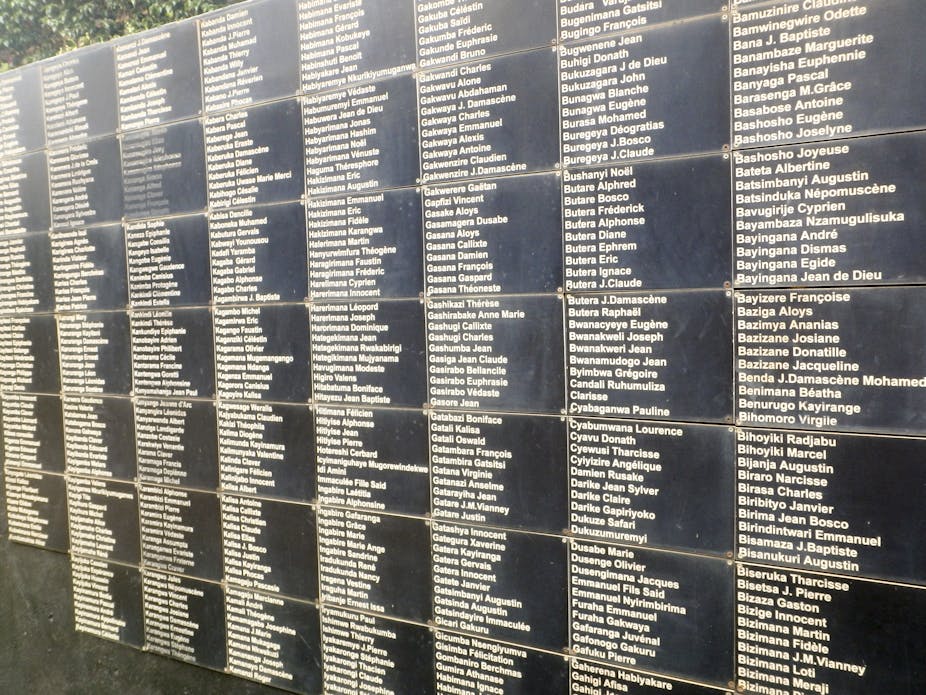Three Rwandan prisoners convicted of genocide by the International Criminal Tribunal for Rwanda have requested early release from the United Nations Mechanism for International Criminal Tribunals. This has drawn widespread anger in Rwanda – from citizens and the government. We spoke to Jennifer Trahan about how this process might unfold.
What is the UN Mechanism for International Criminal Tribunals and how does it work?
It has taken over the remaining work of the two international criminal tribunals set-up to prosecute genocide, crimes against humanity and war crimes committed in Rwanda and the former Yugoslavia.
Article 26 of the UN statute governing the UN Mechanism for International Criminal Tribunal allows those convicted by either the Yugoslav or Rwanda Tribunal to apply for early release. Given that the International Criminal Tribunal for Rwanda finished its work three years ago, the issue of whether any persons convicted by that tribunal should receive early release goes to the UN Mechanism.
How many genocide convicts have had early releases and why are they granted?
Early release often allows the convicted person to serve two-thirds of the sentence. Since the UN Mechanism was established in 2012, it has granted early release to more than 10 of those convicted by the Rwanda Tribunal.
The issue of whether or not a person should be released early is influenced by the confinement practices of the country where the person is serving his or her sentence. Meaning, if local laws are more favourable towards early release, this can have influence on the decision. Two of those who have applied for early release are serving their time in Mali, and one is serving time in Benin.
What were the three Rwandan prisoners, pushing for early release, jailed for?
The three people who have sought early release are Aloys Simba, Dominique Ntawukulilyayo and Hassan Ngeze. They were all jailed for their various roles in the Rwandan genocide in which an estimated one million Rwandans – mostly Tutsis from the country’s minority ethnic group – were killed in the space of 100 days.
Simba was tried for his role in five massacres committed between 14-20 April 1994 in the regions of Gikongoro and Butare. He was convicted of genocide, and extermination as a crime against humanity, and sentenced to 25 years imprisonment. He is serving his sentence in Benin.
Ntawukulilyayo was tried for his involvement in the massacre on Kabuye hill where Tutsis were rounded up, assured of their safety but brutally killed. An estimated 50,000 Tutsis died there. He was convicted of aiding and abetting genocide by instructing the refugees who had gathered at Gisaraga market to move to Kabuye hill, and for transporting soldiers who participated in the attack. He was sentenced to 20 years imprisonment, which he is serving in Mali.
Ngeze was the Editor-in-Chief of Kangura Newspaper, which published inflammatory anti-Tutsi rhetoric. He was convicted, as part of the “media case,” of individual criminal responsibility for
(1) aiding and abetting the commission of genocide in Gisenyi préfecture; (2) direct and public incitement to commit genocide through the publication of articles in his Kangura newspaper in 1994; and (3) aiding and abetting crimes against humanity (extermination) in Gisenyi prefecture.
He was sentenced to 35 years imprisonment, which he is also serving in Mali.
Why are people so angry and what might happen next?
Victims are dismayed by the idea of early release. For example, victims in the former Yugoslavia generally found many of the Yugoslav Tribunal’s sentences too lenient. They were even more upset when early releases further shortened the sentences.
Many victims in Rwanda would no doubt feel the same.
The ideas behind sentencing – and whether there should be early release – raises profound philosophical, moral and legal issues as to how long someone should be sentenced, and the purposes of sentencing. Does one believe a person can be rehabilitated? Has a person really shown remorse? Does it matter that the person showed “good behaviour” in prison? What if the person is now old and/or sick?
It’s also important to keep in mind that those convicted by the Rwanda Tribunal were convicted of indescribably horrific crimes. So, compared to US practices, for instance, where the murder of one person could get someone a sentence of life in prison – or in some US states, a death sentence – the original sentences, without early release, were not ones that appeared to warrant shortening. Most of the accused were convicted of genocide, with victims at some crime scenes in the thousands if not tens of thousands. For crimes of such magnitude, no sentence would seem sufficient.
The other consideration is that when the Rwandan Tribunal judges sentenced a person to a term of years, they probably meant the entire length and were not thinking that it would be reduced by a third.
Having said that, those serving time are legally entitled to apply for early release.
If a person receives early release, where will they go?
They are unlikely to return to Rwanda, and many countries would not let them in. This means that release from serving an International Criminal Tribunal sentence has sometimes left individuals in legal “limbo” with no country willing to allow them in.

